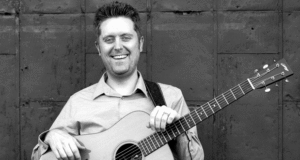Growing up Out West in Utah, Jake Workman never expected, much less aimed to be, an internationally recognized musician. Yet today he’s held the coveted lead guitar position with Ricky Skaggs & Kentucky Thunder for half a decade and recently snagged the International Bluegrass Music Assocation’s 2020 Guitar Player of the Year award, a rarity for a first-time nominee in this worldwide pool of voters and players.
 “In Utah there aren’t a lot of great bluegrass players, and it’s surprising that a person would learn bluegrass really well coming from this state,” Workman says from his home near Salt Lake City, where he started out playing rock n’ roll as an adolescent. His fire for learning bluegrass was stoked at the weekly Rocky Mountain Pizza jam, where he discovered “little pockets” of grass-oriented musicians. Soon, he was navigating the Western festival scene as a hungry young picker. “I would go out to Wintergrass near Seattle and just stay in the hotel all weekend, jamming. I didn’t even know who was playing on stage,” he confesses.
“In Utah there aren’t a lot of great bluegrass players, and it’s surprising that a person would learn bluegrass really well coming from this state,” Workman says from his home near Salt Lake City, where he started out playing rock n’ roll as an adolescent. His fire for learning bluegrass was stoked at the weekly Rocky Mountain Pizza jam, where he discovered “little pockets” of grass-oriented musicians. Soon, he was navigating the Western festival scene as a hungry young picker. “I would go out to Wintergrass near Seattle and just stay in the hotel all weekend, jamming. I didn’t even know who was playing on stage,” he confesses.
So how did Skaggs find him, and did he ever dream that he would get a call like that? “I would jam along with Ricky Skaggs & Kentucky Thunder records. I’d hear Cody Kilby tearing it up and think ‘Am I ever going to play that fast?’ I kept working on it. I never was shooting to be in the band, but I just wanted to be as good as those guys if I could be.” Eventually Workman found that he had developed his own technique for playing at Skaggs’ signature lightning tempos with control and relaxation. “But when the job came around, I had no idea it was coming. On my phone, I saw a Facebook notification from Ricky Skaggs—I couldn’t believe it was real.”
Skaggs hired Workman over the phone without an audition, but with heavyweight recommendations from Kentucky Thunder alums Cody Kilby and Bryan Sutton. Workman says he mused, ‘How am I going to do this from Utah?’ He’d turned down previous offers from other Nashville-based artists, because he didn’t want to uproot from his Utah community. He began his new job in December 2015 by flying to meet the band; he moved to Nashville in 2016. “I didn’t ever think I would live in Nashville,” Workman explains, “but when Ricky called, it’s like ‘How do you say no to that?!’”
Touring with Skaggs has proven to be “a great gig for me—probably more astounding than winning my IBMA award was seeing Ricky’s message pop up on my phone,” Workman remarks. That’s saying a lot, considering Workman was stunned when his name was announced in October. He doesn’t think he was the “most popular guitar player” on the list, judging by social media numbers. However, he intuits that his 2019 guitar-centered album, “Landmark,” put him on the map for voters who were considering his recent contributions to the flatpicking world.
And what inspired this successful recording of original guitar music? “After playing with Ricky for a while I thought, I’d love to be coming out to the CD table after the show with a product that represents exactly what you’re hearing me do onstage, just playing guitar. I’d been writing for several years, and I wanted it to be instrumental—a good picker’s record.” He says he titled his collection ‘Landmark,’ like a “time-stamp: this is me in 2019. I had a vibe, a sound, a feel, a way of writing.”
Workman was able to work on his tunes in auditoriums, waiting for soundcheck on the road. He also uses this downtime for honing his guitar skills and warming up for shows. But when time is short—how can Workman hop out of the bus and perform at high velocity with accuracy and confidence? “I have a lot of muscle memory built into my hands at this point. We’ll call them ‘cop-out licks’—stuff that I can just sling out there that I’ll nail and play well. If I want to do something bold and daring, likely it’s because I have plenty of warm-up time to get to that point. If it’s one of those days when the bus pulls up 5 minutes before we play, I’m not going to warm up much; but when I do warm up for those types of shows, I don’t sit backstage and shred. I warm up slowly. There’s something to be said about calibration: how tight do I hold my pick, where’s my arm, is my shoulder tense, am I letting it fall on the guitar. I’ll just calibrate.”
Listeners may wonder what’s going through Workman’s mind when he is executing his powerhouse solos. Has he planned them out, in any general sense? Is he freely improvising? “I played these songs so many times. They channel into something after a while; there are no two nights that are identical, but I do have templates, especially on the fast ones. I’ve worked them up, or they’ve worked themselves up just by repetition. If I’m having a rough day, I can fall back on a solo I’ve done before. But if the crowd is awesome, and it’s one of those warmed up days, and I’m feeling bold and confident, I’ll go for the craziness. That’s what’s fun, even if there’s risk involved, and I miss a string. Even if I played a show perfectly but all I used the whole show was the same cop-out stuff I’ve used before, the same note-for-note solo, I may have just played great…but I don’t have as much excitement in my heart afterwards. I have a let-down feeling, to be honest. I think, ‘Dang it, I should’ve been bold, I should’ve gone for something, captured the moment; what was in my heart tonight?’ I chickened out, and I don’t want to do that, but sometimes it’s hard to have that mental energy to be brave. And I don’t have it every day.”
During this period of tour cancellations, Workman has relocated, at least temporarily, back to his Utah community, where he teaches lessons full time from home and continues his own study of the guitar. “There’s so much to learn, it never ends,” he muses. “Sometimes I’m excited for the challenge, but often I think, ‘Why can’t I just know everything already?’” And yet—considering his own description of the unpredictable thrill of the boldness that fills his heart on his daring days, perhaps ‘knowing it all’ would leave nothing for that chance.
Jake uses Blue Chip picks. You can check out Jake and his music here; www.jakeworkman.com.
Written By Rebecca Frazier
 Americana Music Magazine – Bluegrass, Roots, Folk, Blues, and Old-Time
Americana Music Magazine – Bluegrass, Roots, Folk, Blues, and Old-Time
